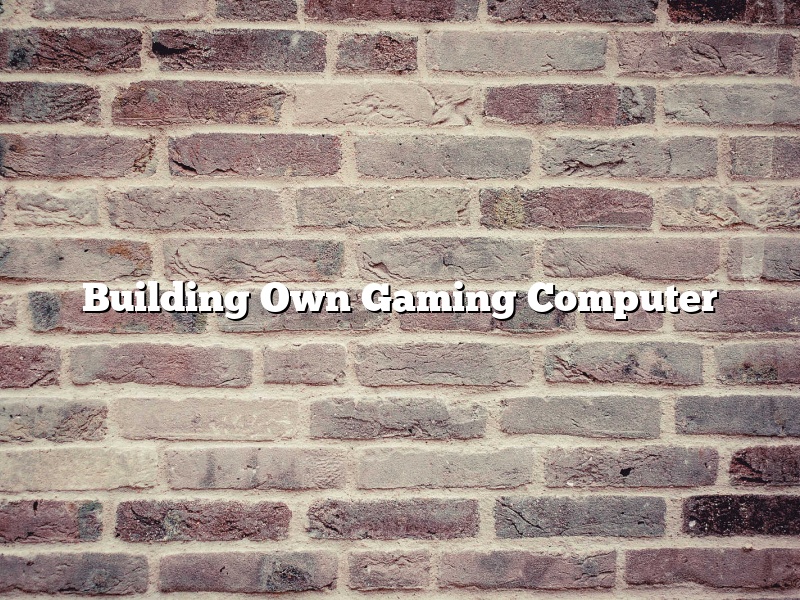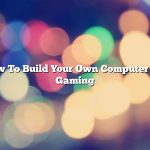With the popularity of PC gaming on the rise, more and more people are looking to build their own gaming computer. This can be a daunting task, but with the right information it can be a fun and rewarding experience. In this article, we will discuss the basics of building a gaming computer.
The first step is to decide on the components that you will need. This will vary depending on your budget and the games that you want to play. The most important components are the processor, the graphics card, and the RAM.
The processor is the heart of the computer and it determines how fast the computer can run. For gaming, you will need a processor that is powerful enough to handle the demands of the games that you want to play. The graphics card is responsible for the graphics and is another important component for gaming. The RAM is important for gaming because it helps to keep the game running smoothly.
Once you have decided on the components, you will need to decide on the case, the power supply, and the motherboard. The case is the enclosure for the components and it is important to choose one that is big enough to fit all of your components. The power supply is responsible for supplying power to the components and it is important to choose one that is powerful enough to handle the demands of your system. The motherboard is the main component of the computer and it determines the type of processor that can be used, the amount of RAM that can be installed, and the type of graphics card that can be used.
Once you have decided on the components, you will need to assemble the computer. This can be done with a few simple steps. First, you will need to install the processor into the motherboard. Next, you will need to install the RAM into the motherboard. Then, you will need to install the graphics card into the motherboard. Finally, you will need to install the motherboard into the case and connect the power supply.
Once the computer is assembled, you will need to install the operating system. The most popular operating system for gaming is Windows 10. Once the operating system is installed, you will need to install the drivers for the components. Once the drivers are installed, you are ready to start gaming!
Building your own gaming computer can be a fun and rewarding experience. It can also be a great way to save money, as you can purchase the components individually rather than buying a pre-built gaming computer. By following the steps in this article, you can build your own gaming computer that will handle the demands of the latest games.
Contents
Is it cheaper to build your own gaming PC?
There’s no question that a custom-built gaming PC offers the best gaming experience. But is it actually cheaper to build your own gaming PC than to buy one?
The answer to that question depends on a number of factors, including the games you want to play and the hardware you need to run them. For example, if you’re only interested in playing older or less demanding games, then you may be able to get away with a relatively low-end gaming PC. But if you want to play the latest and most demanding games, then you’ll need a PC with more powerful hardware.
Another thing to consider is the cost of the individual components. Buying a pre-built gaming PC can be more expensive than buying the components separately and assembling them yourself. But it’s important to remember that you also need to factor in the cost of labour if you’re going to build your own PC.
So is it cheaper to build your own gaming PC? It really depends on your individual needs. If you’re on a tight budget, then it may be cheaper to build your own PC. But if you’re not comfortable assembling your own PC, then it may be cheaper to buy a pre-built one.
How do I start building a gaming computer?
Building your own gaming computer can be a daunting task, but with the help of this guide it can be a breeze.
The first step is to choose the parts you want for your computer. You will need a motherboard, a CPU, a graphics card, memory, a storage drive, and a power supply.
Next, you will need to choose a case. Make sure that the case you choose is big enough to fit all of your parts.
Once you have chosen your parts, it is time to assemble your computer. The motherboard goes in the case, followed by the CPU, the graphics card, the memory, and the storage drive. The power supply goes in the back of the case.
Once your computer is assembled, it is time to install the operating system. You can either install a copy of Windows that you buy from a store, or you can install a free operating system such as Linux.
Finally, it is time to start gaming!
What parts do you need to build your own gaming PC?
Building your own gaming PC can be a fun and rewarding experience, but it can also be a bit daunting if you’re not sure where to start. In this article, we’ll walk you through the parts you need to build your own gaming PC, and we’ll also provide some tips on how to choose the right components for your needs.
First, let’s take a look at the basic components you’ll need to build a gaming PC:
1. Processor
2. Motherboard
3. Memory
4. Storage
5. Graphics card
6. Power supply
7. Case
8. Operating system
Let’s take a closer look at each of these components.
Processor
The processor is the heart of your PC, and it’s responsible for executing the instructions that make your computer run. When choosing a processor for your gaming PC, you’ll want to consider the type of games you plan to play. For instance, if you’re a fan of first-person shooters, you’ll need a processor that can handle heavy workloads and provide excellent performance.
If you’re not sure which processor is right for you, consult our guide to the best processors for gaming.
Motherboard
The motherboard is the backbone of your PC, and it’s responsible for connecting all of the components together. When choosing a motherboard for your gaming PC, you’ll want to consider the type of processor you plan to use, the amount of memory you need, and the type of storage you want.
For more information on choosing a motherboard, consult our guide to the best motherboards for gaming.
Memory
Memory, or RAM, is used to store data that is currently being used by your PC. When choosing memory for your gaming PC, you’ll want to consider the type of games you plan to play. Some games require more memory than others, so you’ll want to make sure you have enough to handle the demands of your favorite games.
For more information on choosing memory, consult our guide to the best memory for gaming.
Storage
Storage is where your data is stored permanently. When choosing storage for your gaming PC, you’ll want to consider the type of games you plan to play. Some games require a lot of storage space, so you’ll want to make sure you have enough room to store all of your favorite games.
For more information on choosing storage, consult our guide to the best storage for gaming.
Graphics card
The graphics card is responsible for rendering the graphics in your games, and it’s one of the most important components in your PC. When choosing a graphics card for your gaming PC, you’ll want to consider the type of games you plan to play. Some games require a more powerful graphics card than others.
For more information on choosing a graphics card, consult our guide to the best graphics cards for gaming.
Power supply
The power supply is responsible for supplying power to all of the components in your PC. When choosing a power supply for your gaming PC, you’ll want to make sure you have enough power to handle the demands of your favorite games.
For more information on choosing a power supply, consult our guide to the best power supplies for gaming.
Case
The case is the enclosure that holds all of the components in your PC. When choosing a case for your gaming PC, you’ll want to consider the type of games you plan to play. Some games require a more powerful case than others.
For more information on choosing a case, consult our guide to the best cases for gaming.
Operating system
Can I build a good gaming PC for $500?
A 500 gaming PC can be a powerful machine, but it’s important to make sure all the parts are compatible and will work well together.
There are many factors to consider when putting together a gaming PC, including the processor, graphics card, RAM, storage, and power supply.
It’s also important to make sure the PC is properly cooled, or it could overheat and damage the components.
There are many different options when it comes to building a gaming PC, so it’s important to do your research to find the best parts for your budget.
For a gaming PC that costs around $500, you can expect a processor such as the AMD Ryzen 3 2200G, a graphics card such as the AMD Radeon RX 550, 8GB of RAM, and a 1TB hard drive.
This configuration should be able to handle most popular games at medium or high settings.
You may be able to get a better gaming experience by spending a bit more money on a more powerful processor or graphics card, but for a budget-minded gamer, this configuration should be more than adequate.
Is it better to build or buy a PC 2022?
There is no one definitive answer to the question of whether it is better to build or buy a PC in 2022. Factors that will affect the answer include budget, usage, and preferences.
When it comes to budget, building a PC can be cheaper in the long run, but it can also be more expensive up front. If a person already has a compatible monitor, keyboard, and mouse, then the only things they need to purchase to build a PC are the actual computer hardware and the operating system. The cost of the computer hardware itself can vary greatly, but typically it is cheaper to purchase components separately than it is to buy a pre-assembled computer.
However, if a person does not have a compatible monitor, keyboard, and mouse, the cost of building a PC will be more expensive. In this case, they would need to purchase all of these items in addition to the computer hardware. The cost of a new monitor, keyboard, and mouse can be expensive, so it may be more cost-effective to buy a pre-assembled computer.
Usage is another factor that needs to be considered when deciding whether to build or buy a PC. If a person only uses their computer for basic tasks such as browsing the internet, checking email, and using basic software, then a pre-assembled computer may be a better option.
However, if a person needs a computer that can handle more intensive tasks such as gaming, video editing, or software development, then they will need to build a PC that is specifically tailored to their needs. This will require more time and effort, but it can result in a more powerful and cost-effective computer.
Finally, preferences should also be taken into account when deciding whether to build or buy a PC. Some people prefer the satisfaction of building their own PC, while others prefer the convenience of buying a pre-assembled computer.
Ultimately, the decision of whether to build or buy a PC in 2022 depends on a person’s individual needs and preferences.
Is building a gaming PC hard?
Is building a gaming PC hard? In a word, no. It can be daunting for a first-time builder, but with a little research it’s a relatively easy process.
The first step is to choose your components. This can be tricky, since there are so many to choose from, but thankfully there are plenty of online resources to help. PC Gamer, Tom’s Hardware, and Anandtech are a few of the best.
Once you’ve settled on your components, it’s time to assemble them. This is where the instructions that come with your parts will be invaluable. There are plenty of online videos as well, such as this one from Newegg TV.
Finally, you’ll need to install the necessary software. This is usually a simple process, and the instructions that come with your components will guide you.
Overall, building a gaming PC is a relatively easy process. With a little research, you’ll be up and gaming in no time.
Is 32GB RAM overkill?
Is 32GB RAM overkill?
When it comes to computer hardware, there’s always a debate about what’s the best possible configuration. This is especially true when it comes to memory. In the past, 8GB was the standard, but now that 32GB and even 64GB configurations are becoming more common, some people are asking if they’re overkill.
The answer to that question depends on your needs and your budget. 32GB is more than enough for most people, but if you do a lot of video editing, gaming, or other memory-intensive tasks, then you may want to consider upgrading to 64GB.
In general, the more memory you have, the better. That’s because the more memory you have, the less your computer has to use its hard drive to store data. This can result in a significant performance boost, especially if you have a slow hard drive.
If you don’t do a lot of memory-intensive tasks, then 8GB or 16GB may be a better option for you. But if you want the best possible performance, then 32GB or 64GB is the way to go.




